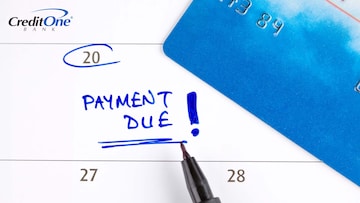
Impact of Poor Debt Management on Credit Score
February 20, 2026
Neglecting to manage your debt can have a negative effect on your credit score. Learn how to avoid this situation with these tips.

Introduction
Credit scores represent and sum up your financial past, so they play a big role in determining your financial future.
That’s why it can be frustrating when you’ve made — and perhaps learned from — past mistakes, and yet your credit score dropped and seems to be holding you back.
In many cases, this may have come from poor debt management. Luckily, you can take steps to better manage debt and safeguard your credit score and financial future.
Understanding Credit Scores
A credit score is a three-digit number calculated from information on your credit reports, which is used by lenders to determine their risk level when lending money.
Someone with a higher credit score can expect better terms on credit cards and loans than someone with a lower credit score. This includes things like interest rates, credit limits and fees.
You might be surprised by how many credit scores you have between different variations and scoring models out there.
But for example, the commonly used FICO® model uses these factors to calculate:
Payment history (35% of your score)
Credit utilization (30% of your score)
Length of credit history (15% of your score)
New credit (10% of your score)
- Mix of credit accounts (10% of your score)
The Connection Between Debt Management and Credit Scores
When you see all the factors that go into a credit score, it’s clear that the biggest — payment history and credit utilization — are tied to your ability to manage your debt levels.
Potential lenders like to see that you’re responsible with credit and loans, pay on time and don’t take on too much debt all at once. That signals that you are likely to repay them.
But a history of missed payments or using too much credit signals the opposite and will ultimately lower your score.
Consequences of Poor Debt Management on Your Credit Score
Mismanaging your debt could start a sequence of events that will not only lower your credit score, but also make it harder to bounce back.
Missed or late payments
By taking on more debt than you can repay, you run the risk of being late on a payment or even missing a payment. Missing even a single payment by 30 days can lower your score by 100 points. And the repercussions don’t stop there.
A missed or late payment can lead to being charged a late fee and having your card’s interest rate, or APR (annual percentage rate), increased. If you’re already struggling to stay current on credit card payments, the additional fees and interest could make it even more difficult to get on track.
High credit utilization ratio
You may think that having access to credit means that you should use all of it. But carrying too much debt at one time can actually have a negative impact on your credit score.
Your credit utilization ratio (CUR) is calculated by taking the total amount of revolving credit you’re currently using and dividing it by the total amount of revolving credit you have.
Experts recommend you use 30% or less of your available revolving credit. Carrying more than this can lower your credit score.
Defaults, charge-offs and debt settlements
Charge-offs and debt settlements are some of the most negative credit events that can appear on your credit report and lower your credit score significantly.
Defaulting — failing to repay a debt past 180 days — will lower your credit score on top of the damage already done by the initial late and missed payment dings along the way.
And at that point, the debt will likely be charged off by the creditor and sold to a collections agency. You may be able to negotiate a debt settlement agreement, but this is another negative credit event — and one that remains on your report for up to seven years from the date of the original late payment.
Increased interest rates and reduced credit opportunities
Once you have a lower credit score due to some of the factors above, it will limit your future credit opportunities. You’re more likely to be declined for credit card applications and may even find it hard to qualify for loans. What cards and loans you do qualify for will likely have extremely high APRs and less lucrative terms in general.
Strategies to Prevent Credit Score Decline Through Effective Debt Management
Luckily, you can use a few strategies to manage your debt levels and ultimately help protect your credit score from dropping.
These tips can also be applied toward rebuilding credit after it’s dropped due to poor debt management.
Developing a realistic budget
Having a budget system that aligns with your life is a great way to manage debt. You can use past bank or credit card statements to break down your typical spending and get an accurate picture for a starting budget. Once you’ve worked out wants, needs, essential and non-essential spending, you can use apps, spreadsheets or even pen and paper to track your budget and adjust as you go.
If you stick to your budget, you can avoid spending that you can’t afford or taking on debt with payments that you can’t make.
Ensuring timely payments
Since payment history is the most significant factor in calculating your credit score, you want to ensure that you pay at least the minimum payment due on time, every time.
Making notes, setting up reminders or signing up for AutoPay with your bank or creditor can help you keep on track with this, but it should be a top priority for maintaining your credit score.
Managing credit utilization
As the second most significant factor in your credit score, credit utilization is something you’ll want to keep an eye on.
Don’t use more than 30% of your total available credit and avoid closing credit cards, even if you don’t use them, so that they still count toward your total available credit. Keeping older cards open comes with the added benefit of helping your average age of credit.
Regular monitoring of credit reports
Keeping an eye on your credit reports can ensure that the information is accurate. Make sure all the accounts and debts listed are actually yours.
And even if you have certain negative credit events on your credit report, you’ll want to ensure that they’ve actually dropped off when they were supposed to. You can then dispute any credit reporting errors you find with the three major credit bureaus.
Examples of The Impact of Debt Mismanagement
There’s a lot to this. We’ve come up with two example scenarios to illustrate how all these concepts play out. Let’s start with an example that sees the strategies we outlined in action.
Proactive debt management at work
Alex used past statements to develop a budget and get spending under control. Besides spending totals, Alex also makes sure to keep total credit utilization under the recommended 30% mark.
Making a realistic budget — and sticking to it — means Alex can pay at least the minimum amount due on any credit card payments.
Signing up for the card issuer’s AutoPay feature can help avoid issues with late payments and may prevent any missed payments.
Along with semi-annual credit report monitoring, Alex is on track to likely avoid any of the pitfalls we’ve discussed.
Ripple effects of debt mismanagement
On the other hand, Pat hasn’t developed a budget. Some overspending here and there eventually leads to being unable to make the minimum payment on time, which leads to a late fee of up to $29.
Pat can make this payment shortly afterward, including the late fee. Since it was before the account was 30 days due, Pat’s credit didn’t take a hit — credit reporting bureaus typically report after 30 or more days late.
But a large, unexpected expense comes up just a few months later, and due to some continued overspending, Pat can’t make this payment within 30 days.
First off, the late fee can be up to $40 this time around, which is the case if you pay late more than once in six billing cycles.
Second, since Pat can’t pay within 30 days, it will be reported to the credit bureaus and could trigger an initial drop in credit score.
Third, for the sake of this exercise, let’s say Pat’s credit utilization is higher than 30% at this point. That’s yet another factor lowering Pat’s credit score.
And that’s without getting into the likely increased interest rate Pat now has to contend with because of the initial missed payment. That’s interest on both the balance and late fees, of course.
We’ll stop our exercise there — and we’ll say Pat developed a budget, got on top of everything and had a happy ending like Alex.
But it goes to show that even before we get into negative credit events like charge-offs, mismanaged debt can have a serious impact on your credit score.
Bottom Line
A good credit score is essential to your credit opportunities and overall financial stability.
You can take a lot of steps to maintain it, but managing your debt wisely is one of the most effective things you can do to protect your credit score.
Manage your debt well and you’ll make it easier to stay on the right track financially.



